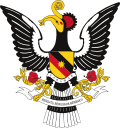| Portfolio | Officeholder | Party | Constituency | Term start | Term end |
|---|
| Deputy Minister in the Premier's Department | Datuk Hajjah Sharifah Hasidah binti Sayeed Aman Ghazali
(Law, MA63 and State-Federal Relations) | | PBB | Samariang | 4 January 2022 | Incumbent |
Datuk Gerawat Gala
(Labour, Immigration and Project Monitoring) | | PBB | Mulu |
Datuk Abdullah bin Haji Saidol
(Corporate Affairs and UKAS) | | PBB | Semop |
Dato Murshid Diraja Dr. Juanda Jaya
(Integrity and Ombudsman) | | PBB | Jemoreng |
Datuk Jefferson Jamit anak Unyat
(Native Law and Customs) | | PBB | Bukit Goram |
Datuk Dr. Haji Abdul Rahman bin Haji Junaidi
(DBKU, Islamic Affairs & Project Coordinator for Regional Development Agency) | | PBB | Pantai Damai | 17 March 2025 |
| Deputy Minister for Natural Resources and Urban Development | Datu Haji Len Talif Salleh | | PBB | Kuala Rajang | 4 January 2022 |
| Deputy Minister for Energy and Environmental Sustainability | Datuk Dr. Haji Hazland Abang Hipni | | PBB | Demak Laut |
| Deputy Minister for Infrastructure and Port Development | Datuk Ir. Aidel bin Lariwoo
(Infrastructure Development) | | PBB | Sadong Jaya |
Dato Majang anak Renggi
(Port Development) | | PRS | Samalaju |
| Deputy Minister for International Trade and Investment | Datuk Dr. Malcom Mussen anak Lamoh | | PRS | Batang Ai |
| Deputy Minister for Public Health, Housing and Local Government | Datu Dr. Penguang anak Manggil
(Public Health and Housing) | | PDP | Marudi |
Datuk Michael Tiang Ming Tee
(Local Government) | | SUPP | Pelawan |
| Deputy Minister for Modernisation of Agriculture and Regional Development | Datuk Dr. Haji Abdul Rahman bin Haji Ismail
(Modernisation of Agriculture) | ` | PBB | Bukit Kota |
Datuk Maclaine @ Martin Ben
(Regional Development) | | PBB | Kedup |
| Deputy Minister for Transport | Datuk Dr. Jerip anak Susil | | PBB | Mambong |
| Dato Henry Harry anak Jinep | | PDP | Tasik Biru |
| Deputy Minister for Utility and Telecommunication | Datuk Dr. Haji Abdul Rahman bin Haji Junaidi
(Utility) | | PBB | Pantai Damai | 17 March 2025 |
Datuk Ibrahim Baki
(Utility) | | PBB | Satok | 17 March 2025 | Incumbent |
Datuk Liwan Lagang
(Telecommunication) | | PRS | Belaga | 4 January 2022 |
| Deputy Minister for Tourism, Creative Industry and Performing Arts | Dato Sebastian Ting Chiew Yew
(Tourism) | | SUPP | Piasau |
Datuk Snowdan anak Lawan
(Creative Industry and Performing Arts) | | PRS | Balai Ringin |
| Deputy Minister for Youth, Sport and Entrepreneur Development | Dato Gerald Rentap Jabu
(Youth and Sport Development) | | PBB | Layar |
Datuk Dr. Ripin bin Lamat
(Entrepreneur Development) | | PBB | Lambir |
| Deputy Minister for Women, Early Childhood and Community Wellbeing Development | Datuk Hajah Rosey Haji Yunus
(Women and Early Childhood Development) | | PBB | Bekenu |
Datuk Ricky @ Mohd Razi bin Sitam
(Community Wellbeing Development) | | PBB | Saribas |
| Deputy Minister for Education, Innovation and Talent Development | Datuk Dr. Haji Annuar bin Rapaee
(Education and Innovation) | | PBB | Nangka |
Datuk Francis Harden anak Hollis
(Talent Development) | | SUPP | Simanggang |
